

Psychologie de la négociation. Souvent confinée à l’étude des techniques permettant de vendre une encyclopédie en 24 volumes à une octogénaire récalcitrante ou à l’art de marchander son salaire, la négociation est souvent abordée sous un angle exclusivement utilitariste.
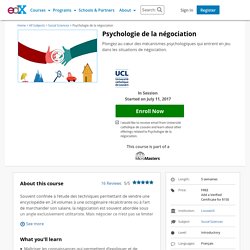
Mais négocier ce n’est pas se limiter à la recherche du bénéfice maximum. La négociation traverse toutes les dimensions de la vie humaine. Nous négocions tous les jours, dans toutes les sphères de notre existence : au travail, avec la famille, les amis… Dès qu’il s’agit de partager des biens matériels mais aussi de résoudre une divergence d’intérêts, de concilier différentes envies, rêves, goûts, couleurs… Ce cours s’éloigne de l’approche classique des négociations et tente de rendre compte des phénomènes psychologiques à la base du comportement.
L’approche poursuivie sera descriptive plutôt que prescriptive. Ce cours sera enseigné en français. Sciences cognitives - Comment changer l'Ecole. Apprendre et faire apprendre. L'inscription au MOOC Comment m’inscrire au MOOC « Apprendre et faire apprendre » ?

Les inscriptions se font uniquement à partir du lien suivant : Toute demande d’inscription fera l’objet d’un mail de confirmation. Je me suis inscrit en ligne, mais je n’ai pas reçu une confirmation par mail ? Le mail de confirmation peut prendre quelques jours pour vous parvenir. Infos du cours (AFA) Giving Helpful Feedback - University of Colorado Boulder. About this course: This course teaches you the simple principles expert managers use to improve and motivate employee performance.

You’ll never have to avoid telling an employee “the truth” again, because the seven techniques we teach will not make employees defensive or afraid. As a manager, or someone who would like to be a manager, you’ll also learn specifically what feedback is, how negative feedback is weighed more heavily than positive, and how positive feedback can super-charge behaviors such as creativity and teamwork. Understanding Memory: Explaining the Psychology of Memory through Movies - Wesleyan University. About this course: Welcome to Understanding Memory: Explaining the Psychology of Memory through Movies.
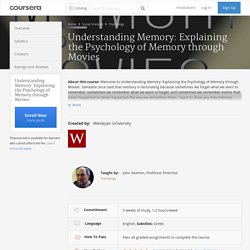
Someone once said that memory is fascinating because sometimes we forget what we want to remember, sometimes we remember what we want to forget, and sometimes we remember events that never happened or never happened the way we remember them. I want to show you how memory works, why it sometimes fails, and what we can do to enhance memory function, especially as we get older. The Bilingual Brain - University of Houston System. About the Course How do two languages get processed in one brain?
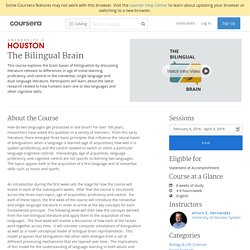
For over 100 years, researchers have asked this question in a variety of manners. From this early literature, there emerged three basic principles that influence the neural bases of bilingualism: when a language is learned (age of acquisition), how well it is spoken (proficiency), and the control needed to switch or select a particular language (cognitive control). Interestingly, age of acquisition, language proficiency, and cognitive control are not specific to learning two languages.
The topics appear both in the acquisition of a first language and of nonverbal skills such as music and sports. An introduction during the first week sets the stage for how the course will evolve in each of the subsequent weeks. Course Syllabus Week 1 - IntroductionThe first week serves as an introduction. Week 3 - Age of Acquisition II This section of the course extends the nature of development to two languages.
Learning How to Learn: Powerful mental tools to help you master tough subjects - University of California, San Diego. Powerful Tools for Teaching and Learning: Digital Storytelling - University of Houston System. About the Course Powerful Tools for Teaching and Learning: Digital Storytelling introduces educators to digital storytelling and explores ways to use digital stories to enhance students’ learning experience.

The course is designed to be comprehensive yet fundamental. By comprehensive we mean that the course provides a solid foundation to all of the components of a digital story and illustrates these components with tutorials, example stories and links to additional readings. The course also provides a hands-on opportunity for learners to create their own digital stories. The course is fundamental because it covers the basic process of creating a digital story starting with just a simple script and as little as one still image. Hub5 ECO Learning. Ce MOOC « Ma pédagogie à la sauce web 2.0 » s’inspire du Master à distance AIGEME (Applications informatiques : gestion, éducation aux médias et E-Formation) proposé par l’Université Sorbonne Nouvelle.
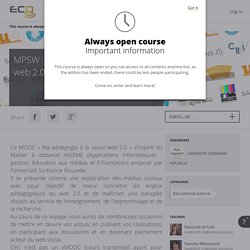
Coursera. MOOC MPSW 2015. The World Clock — Worldwide. Event Time Announcer. Time Zone Map. DST – Click red dot for more info Legend: How to use the interactive Time Zone Map Search for any city in the search field above and place a black "pin" by that city on the map.
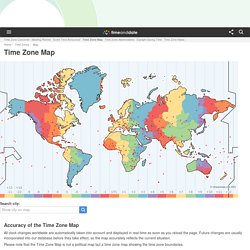
If you place more than one pin, an extra line of information is added underneath the map with links to those cities' pages. You may add as many pins as you like. To remove the pins permanently (undo not possible), simply click here or on the Time Zone Map link in the menu above.Hover your mouse over any of the red dots to see the name of the city and country and current local time. More about the Time Zone Map.